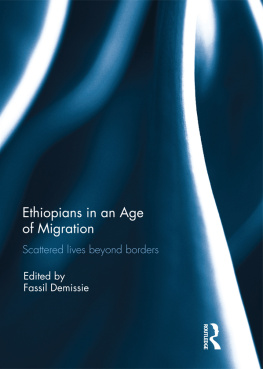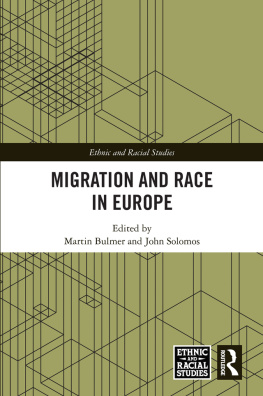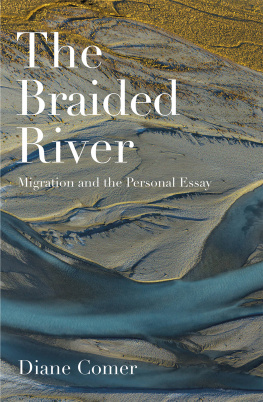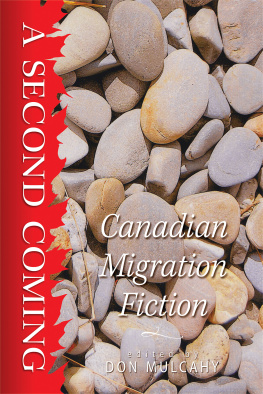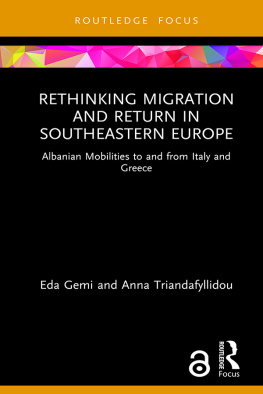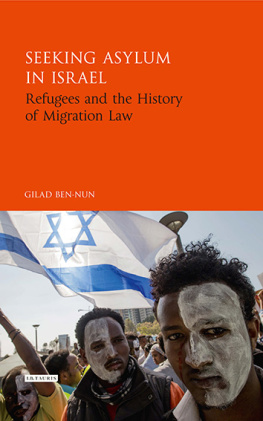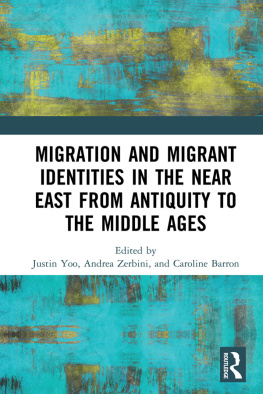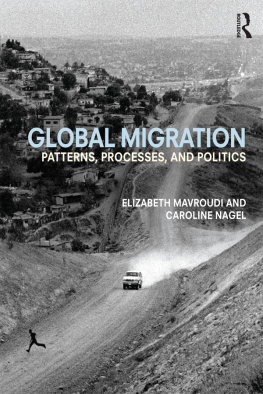ISBN 978-3-11-052641-7
e-ISBN (PDF) 978-3-11-052887-9
e-ISBN (EPUB) 978-3-11-052653-0
Library of Congress Cataloging-in-Publication Data
A CIP catalog record for this book has been applied for at the Library of Congress.
Bibliographic information published by the Deutsche Nationalbibliothek
The Deutsche Nationalbibliothek lists this publication in the Deutsche Nationalbibliografie; detailed bibliographic data are available on the Internet at http://dnb.dnb.de.
2018 Walter de Gruyter GmbH, Berlin/Boston
www.degruyter.com
Acknowledgements
This book book is a result of a multidisciplinary research group, which has been working at the University of Tampere, Finland, including historians and social scientists. Our primary collaborating partners have been Professor Margrit Schulte Beerbhl and Adjunct Professor Tuomas Martikainen, whose expertise in migration studies has given enormous help to our research. We have also had the opportunity to co-operate with the research program Baltic Borderlands: Shifting Boundaries of Mind and Culture in the Borderlands of the Baltic Sea Region based at the Ernst Moritz Arndt University of Greifswald, Germany. We thank Professor Michael North, Dr. Maare Paloheimo and Dr. Alexander Drost for organizing, together with us, the seminar Migration, Memory, and Media: Collective Memory and Representations of Intercultural Mobility in April 2017, in Berlin. Our warm thanks also goes to Dr. Laura Hirvi, the Director of the Finland-Institute in Germany for hosting this event and all the scholars who participated in this academic gathering and discussed the results of our research project. The authors of this book have had the opportunity to present their chapters-in-progress in various conferences, seminars and unofficial meetings with colleagues. Thank you all who contributed to this project as peer-reviewers, commentators and proof-readers. The outcomes of this book would not be the same without smooth access to several archives and fluent cooperation with all our informants, archivists and other partners in the collection of the data. In addition, we thank Dr. Raisa Maria Toivo, whose advice has been priceless, and Risto Kunnari, who helped with numerous practical matters. Furthermore, we thank Ilaria Tucci for the beautiful cover picture taken from the island of Lampedusa and our editor Elise Wintz, for her advice, support and patience. The project was conducted with the financial support received from the Finnish Cultural Foundation, the Finnish Academy of Science, the Finnish Centre of Excellence in Historical Research History of Society: Re-thinking Finland, 14002000, and from the project Remembering the Tragedy of Lampedusa: radical participation in documentary film making, funded by the Kone Foundation, Finland.
Pfunds, Nokia and Jyvskyl, August 25, 2017
Maija Ojala-Fulwood, Ulla Ijs and Pirita Frigren.
List of Contributors
Pirita Frigren (PhD) works as a post-doctoral researcher in the Department of History and Ethnology at the University of Jyvskyl, Finland. In her PhD thesis (2016) she discussed merchant sailors spouses, womens agencies in the urban seaport community, and sailors family economy in nineteenth-century Finland. Her current fields of interest cover, for example, mobile maritime labor and the economic contribution of poor men and women preindustrial towns. She is a co-editor of the Journal of Finnish Studies thematic issue Poverty of a Beggar and a Nobleman: Experiencing and Encountering Impoverishment in Nineteenth-Century Finland (vol. 20, 1/2017).
Ulla Ijs (PhD) is currently working as an acting university lecturer at the University of Turku, Finland. Before this post, she held a post doctorate position in Faculty of Law at the University of Helsinki. In her research, she has focused on material culture history, the history of family business and the urban history of the eighteenth century Northern Baltic. Her latest publications are Marie Hackman The female manager in the family firm Hackman & Co, in Women in Business Families: From Past to Present, Gender in Business Families , edited by Jarna Heinonen and Kirsi Vainio-Korhonen, Routledge, London and New York (forthcoming 2017) and English Luxuries in Nineteenth Century Vyborg, in A Taste for Luxury in Early Modern Europe. Display, Acquisition and Boundaries , edited by Jon Stobart and Johanna Ilmakunnas, Bloomsbury, London, 2017.
Anitta Kynsilehto (DSocSci) works as a senior research fellow at the Tampere Peace Research Institute, University of Tampere, Finland. Her research interests include mobility, migration, solidarity action, intersectionality, and postcolonial theory. She is the author of numerous journal articles and book chapters, and two recent monographs: Choreographies of Resistance: Mobile Bodies and Relational Politics (with Samu Pehkonen, Eeva Puumala, Tiina Vaittinen and Tarja Vyrynen) and Gender and Mobility: A Critical Introduction (with Elina Penttinen), both with Rowman & Littlefield International in 2017.
Mari Korpela (PhD) is senior lecturer at the University of Tampere, Finland. Her field of research is social anthropology and she has conducted extensive ethnographic research among Western lifestyle migrants in India. Her research interests include anthropology of childhood, third culture kids, lifestyle migration, transnational communities, countercultures, gender and travel, skilled migration, and ethnographic research methods. She has been a visiting scholar at the Sussex Centre for Migration Research, UK. Dr. Korpela has published in both national and international journals and authored several book chapters for internationally edited volumes. She has also edited three books.
Riitta Laitinen (PhD) works as a research fellow at the Department of Cultural History at the University of Turku. Her research interests lie in early modern urban and everyday history and in the theories of spatiality and materiality. She has just published Order, Materiality, and Urban Space in the Early Modern Kingdom of Sweden with Amsterdam University Press (2017).
Henrik Mattjus (MA) is a researcher and doctoral student at the University of Tampere. Currently he is writing his doctoral dissertation about the modernization of domestic space in the Finnish smallholder home in 1920s and 1930s. His thesis is part of the research project Experts, Communities and the Negotiation of the Experience of Modernity funded by the Kone Foundation.
Maija Ojala-Fulwood (PhD) has worked as a post-doctoral researcher at the University of Tampere. She has specialized in urban history of the Baltic Sea region in the late medieval and early modern times. Her special interests are everyday life, craft trade culture and craft organizations. Her fields of research include gender history, economic history and migration history. Additionally she has studied lived religion within the urban communities and environmental history. Her latest publications are Water and urban space in late medieval Stockholm, in Mapping Water: Histories of Water and Culture in Euro-American Modernity , edited by Jane Costlow, Yrj Haila and Arja Rosenholm, and Urban funeral practices in the Baltic Sea Region, in Lived Religion and the Long Reformation in Northern Europe c. 1300 1700 , edited by Sari Katajala-Peltomaa and Raisa Maria Toivo, both with Brill (2017).
Samu Pehkonen (PhD) is University Researcher at the Tampere Peace Research Institute, University of Tampere, Finland. He is currently involved in a larger research project on the mundane practices of peace, funded by the Academy of Finland. His research interests are strongly influenced by ethnomethodology and studies of social interaction. His research interests include hate speech in online environments, authority in police work and social interaction in natural settings.


